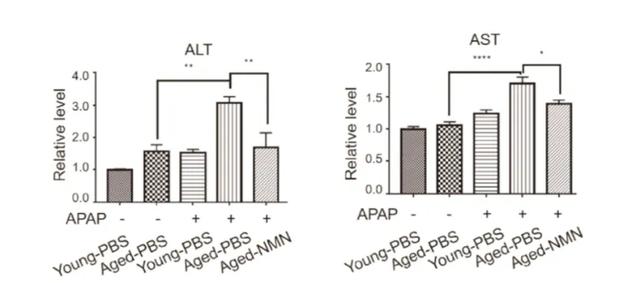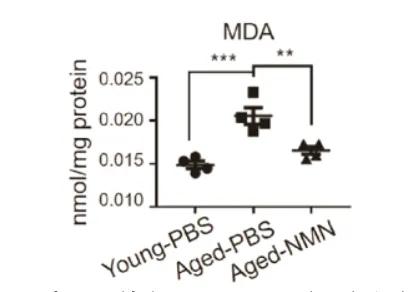
The liver is an important organ of the human body, which is easily damaged by many factors. Protecting liver health is crucial.
NMN is an anti-aging substance that restores cellular fitness and prevents liver damage.
The study found that NMN reduces oxidative stress and maintains liver homeostasis by activating Sirtuin enzymes and antioxidant defense mechanisms.
More clinical studies are needed to verify the effect of NMN on human liver.
Healthy Tips:
The liver occupies an important position in the human body, and its functions are diverse and critical.
As the largest substantive glandular organ in the human body, the liver is responsible for performing a variety of complex physiological functions, undertaking metabolism, deoxidation, storage of liver sugars, secreted protein synthesis and other functions, which are essential for maintaining human life activities.
However, the liver is also a relatively fragile organ that can be damaged by a variety of factors.
For example, poor living habits, eating habits, drug abuse, viral infections, etc., may lead to liver disease.
As the saying goes: nourishing the liver is nourishing the life.
Protecting liver health is crucial, and we should pay attention to liver health and actively prevent and treat liver diseases to keep the body healthy and vibrant.
The most striking feature that makes us unique is our unparalleled ability to adapt.
This ability is reflected in the ability of our cells to activate protective mechanisms and respond effectively to environmental and metabolic stress to maintain the homeostasis of life.
However, this cellular fitness gradually diminishes with age, which is the basis of the aging process.

Researchers from Tsinghua University have published a study in the Journal of Proteomics Research, revealing the potential mechanism by which NMN (niacinamide mononucleotide) fights aging.
The study showed that NMN can show a powerful anti-aging effect by restoring the adaptability of cells.
It is worth mentioning that the researchers also found that NMN can effectively prevent liver damage by activating the sirtuin enzyme, which is closely related to longevity, and enhancing antioxidant defense.
In addition, further experiments have shown that NMN can mediate repair protective adaptation and successfully rebuild liver homeostasis in aging mice.
NMN can prevent liver injury by reducing oxidative stress
To further investigate the effects of NMN on liver damage, the researchers took 96-week-old mice (which is equivalent to about 65 years of human age) and injected them with 500 mg/kg of NMN.
Subsequently, the researchers used acetaminophen (APAP) to induce liver damage in mice, because excessive APAP can cause severe liver toxicity and is a major cause of liver failure.
The results showed that APAP significantly increased the levels of ALT and AST, markers of liver damage in the blood of aged mice.
However, after intervention with NMN, the levels of these markers successfully returned to baseline levels in young mice.

ALT and AST levels were measured to assess paracetamol (APAP) -induced liver injury.
Untreated Aged mice (Aged-PBS) showed increased liver damage, while NMN(Aged-NMN) restored the level of Young mice (young-PBS).
As we age, the accumulation of harmful reactive oxygen species causes oxidative stress, which in turn causes damage to macromolecules such as carbohydrates, proteins, DNA/RNA, and fats.
When oxidative stress damages fats (lipids), concentrations of a compound called malondialdehyde (MDA) rise.
Interestingly, during the experiment, the researchers found that NMN significantly reduced MDA levels in the livers of old mice.
In addition, NMN also increased the activity of the antioxidant enzyme Sod2, which further indicated that oxidative stress was alleviated.

Untreated old mice had high levels of MDA proteins in their livers, a marker of oxidative stress.
MDA levels in older mice treated with NMN (Ageg-NMN) were similar to those in untreated Young mice (Young-PBS), indicating reduced oxidative stress.
Sirtuins are a family of enzymes that are closely associated with a range of functions related to cell survival and are therefore also thought to be involved in life extension.
Among them, Sirtuin3 (Sirt3) plays a crucial role in regulating mitochondrial resistance to oxidative stress.
This experimental study suggests that the effect of NMN is mediated by Sirt3.
When they removed Sirt3 from mice by special means, many of NMN's effects disappeared.
Notably, Sirt3 uses NAD+ as its "fuel," while NMN is the substrate needed to synthesize and boost NAD+ levels.
NMN can enhance adaptive homeostasis
Research has shown that a protein called Nrf2 is one of the most important regulators of oxidative stress.
During oxidative stress, Nrf2 is typically transferred to the nucleus, where antioxidant genes are activated.
Nrf2 plays a protective role against oxidative stress by activating antioxidant genes and maintains the homeostasis (physiological balance) in the body.
Researchers at Tsinghua University found that Nrf2 failed to migrate into the nucleus during liver damage in older mice, indicating a lack of protective response;
When NMN treated old mice with liver injury, Nrf2 was successfully transferred into the nucleus.
This finding suggests that NMN can enhance the adaptive ability to resist oxidative stress and maintain homeostasis.
Can NMN delay human liver aging?
Some previous studies have shown that NMN can slow liver aging in rodents in several ways, such as inhibiting the occurrence of liver fibrosis (scarring) in mice by improving telomere length.
In human clinical trials, NMN has also been shown to reduce lipid levels associated with fatty liver disease.
However, it is important to note that more clinical studies are needed in the future to examine the specific effects of NMN on human liver function.
reference
[1]Luo C, Ding W, Yang C, Zhang W, Liu X, Deng H. Nicotinamide Mononucleotide Administration Restores Redox Homeostasis via the Sirt3-Nrf2 Axis and Protects Aged Mice from Oxidative Stress-Induced Liver Injury. J Proteome Res. 2022 Jul 1;21(7):1759-1770. doi: 10.1021/acs.jproteome.2c00167. Epub 2022 Jun 14. PMID:35699728.
- Explore NMN: A new hope for anti-aging
- Long-term supplementation of NMN can increase vascular elasticity
- The secret of glutathione Body whitening
- The antioxidant activity of NMN may prevent liver damage
- NMN is essential for maintaining vision in old age
- NMN: Unlocking new hope for life vitality
- Glutathione injection in the medico-Chinese ratio dosage usage and precautions!
- Pathways to increase mitochondrial glutathione levels
- Glutathione supplementation can reduce skin dark spots and wrinkles
